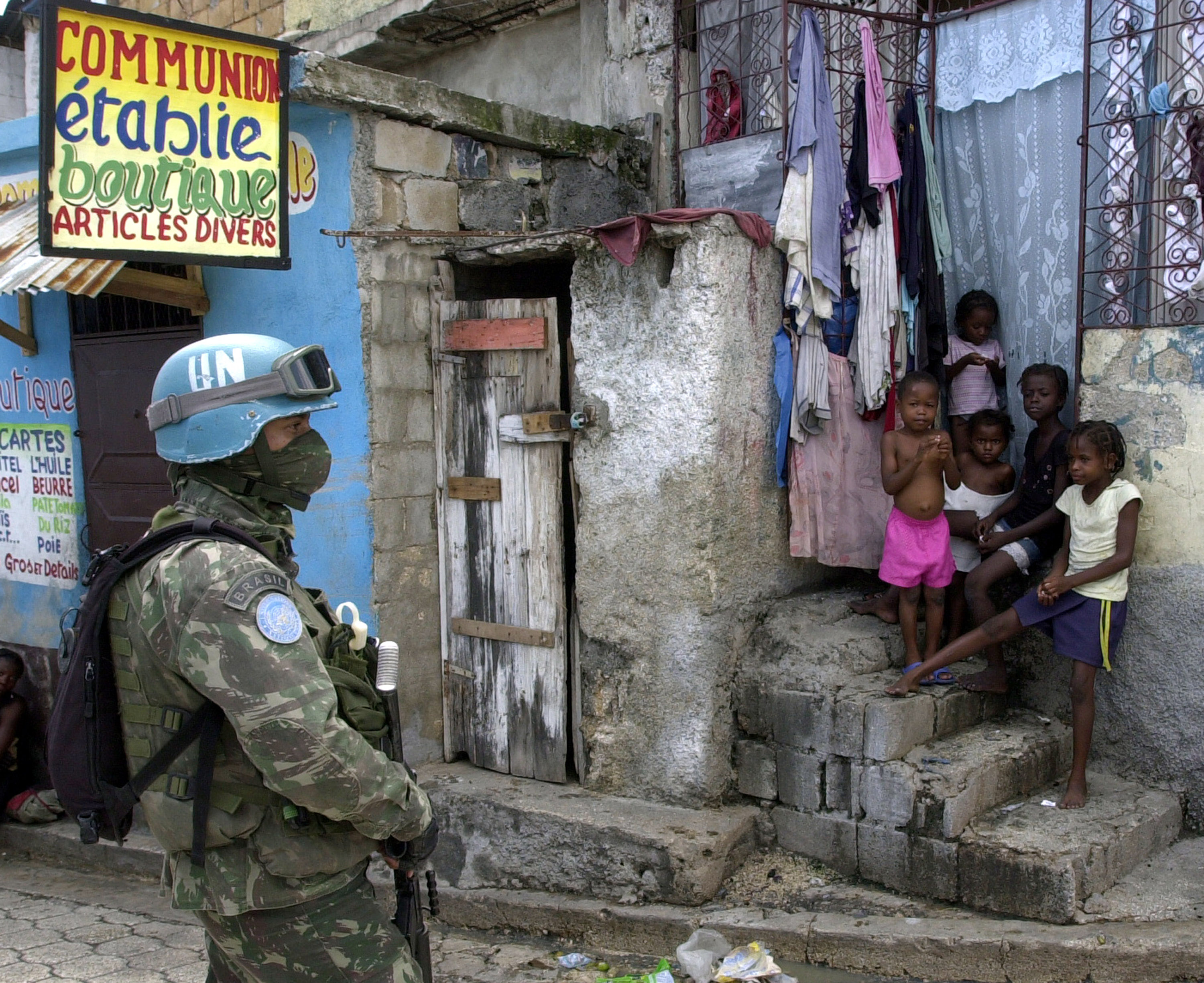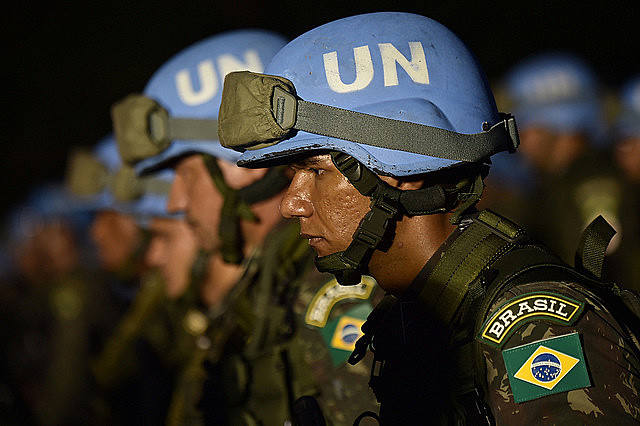In the early morning of July 6, 2005, troops of the UN Stabilization Mission in Haiti (MINUSTAH), commanded by the Brazilian army, conducted a “pacification” operation in the largest slum in the Haitian capital, Port-au-Prince, known as Cité Soleil. According to witnesses, some 300 heavily armed men invaded the neighborhood and murdered 63 people, leaving another 30 wounded.
At the time, the commander of the MINUSTAH was the Brazilian general Augusto Heleno, today the chief minister of the Institutional Security Cabinet (GSI), responsible for intelligence in the Jair Bolsonaro administration.
The action was the subject of a complaint to the Inter-American Commission on Human Rights (IACHR), based on testimonies from residents and a report prepared by the Center for Global Justice and Harvard University (USA). In the document, the MINUSTAH was accused of allowing abuses to occur, favoring impunity and contributing to the wave of violence in the Caribbean country.
The case seemed to have caused discomfort in Brasília, then led by former president Luiz Inácio Lula da Silva. A source linked to the Ministry of Defense confirmed to Brasil de Fato that the Brazilian government had received a request from the UN to replace the command of troops in Haiti, which was done days later, when general Urano da Teixeira da Matta Bacellar took office.
In response to the accusations, Bacellar stated that the number of deaths did not coincide with the information collected by the army. According to the general, “nine or ten people” would have died after confronting the security forces.
“The fact is that [Augusto] Heleno was removed from Haiti and it began to stoke the anger of the Workers' Party administrations [of Lula and Dilma Rousseff]. The trigger was really the National Truth Commission. From then on, he became a fierce anti-Workers' Party advocate,” the source said.
The Haitians and the MINUSTAH
Experts point to the international missions of the Brazilian army, especially in Haiti and Congo, as a kind of training course for the Armed Forces in direct work with public security, a new vision in the institution. The results can be measured by the perception of the populations of these countries about foreign military action.
Luis Felipe Magalhães, a researcher at the Observatório das Migrações and post-doctoral fellow in Social Sciences at the Pontifical Catholic University of São Paulo, was in Haiti, where he conducted field research and interviewed researchers and residents in the Haitian capital about, among other things, the activities of MINUSTAH forces in that country.
“MINUSTAH has often produced conflicts in places where there were no conflicts, and most interviews speak specifically of Cité Soleil: ‘MINUSTAH is there, does not know how to operate, does not know the political dynamics and the local territorial disputes, and from the moment it enters and undertakes actions without strategy, it worsens the conflict.’ This I heard from several researchers and many people that I interviewed there.”
According to Magalhães, the earthquake that occurred in 2010 revealed the inoperability of MINUSTAH in peacekeeping and the worsening of conflicts caused precisely by the lack of strategic planning for contingency.
“MINUSTAH had not created any territorial logistics for maintaining food security, which is an indispensable aspect for the maintenance of peace, for reducing conflicts. MINUSTAH had not developed such logistics, did not know how to conduct operations, donations, everything that the world was donating and transferring to Port-au-Prince. And in this case, it made manifest the same mistakes it made in specific military actions: they made matters worse.”
 MINUSTAH soldier patrols poor neighbourhood in the Haitian capital, Port-au-Prince | Tony Beliza
MINUSTAH soldier patrols poor neighbourhood in the Haitian capital, Port-au-Prince | Tony Beliza
The MINUSTAH in the Bolsonaro administration
On Feb. 18, president Jair Bolsonaro announced the resignation of Gustavo Bebianno (PSL) from the General Secretariat of the Presidency of the Republic and his replacement by General Floriano Peixoto. On the same day, the newspaper Valor Econômico published a report in which it highlighted the increase in power of the “Haitian clique” in the government.
According to Paulo Cunha, a professor of political science at the State University of São Paulo (UNESP), it is “undeniable” that the group has been organized based on the experiences they have had in external Army missions.
“Although the Armed Forces, the armies in particular, in their history, are not a monolithic bloc, this group was undeniably constituted as an articulated bloc.”
In addition to Peixoto and General Augusto Heleno, three other ministers were in the Caribbean country: General Fernando Azevedo e Silva (Defense), General Carlos Alberto dos Santos Cruz (Government Secretariat) and Captain Tarcísio Gomes de Freitas (Infrastructure). In addition to the ministers, four strategic secretariats are occupied by military personnel who participated in the mission in Haiti: Colonels José Arnon dos Santos Guerra and Freibergue Rubem do Nascimento of the Ministry of Justice, General Edson Leal Pujol, of Defense, and the official spokesman of the Presidency of the Republic, linked to the Government Secretariat, General Otávio Santana do Rêgo Barros.
For Cunha, the involvement of the military with politics in Brazil is nothing new. “People are a little surprised by the military in politics. The military never ceased to be in politics and never ceased to be involved or to engage in politics.”
Outside the government, at the Supreme Court, General Ajax Porto Pinheiro holds the position of Special Advisor to the president of the court, Minister Dias Toffoli. He was the commander of the MINUSTAH between October 2015 and October 2017.
What General Minister Augusto Heleno says
In response to questions raised by Brasil de Fato through the press office of the Institutional Security Cabinet, Minister Augusto Heleno denied any coordination between these military forces within the government and stated that “the MINUSTAH mission in Cité Soleil, in July 2005, was praised by the UN.” The statement also called the denunciations made by human rights organizations “unfounded,” which, he said, “were politically motivated.”
Finally, the statement quotes a supposed “private document of the Ministry of Foreign Affairs, addressed, at the time, to the Ambassador of Brazil to the UN.” In the “private document,” the Brazilian government explains that the replacement of General Augusto Heleno is the “practice observed by the Ministry of Defense (of) replacing, after one year of service, military officers assigned” to that job.




